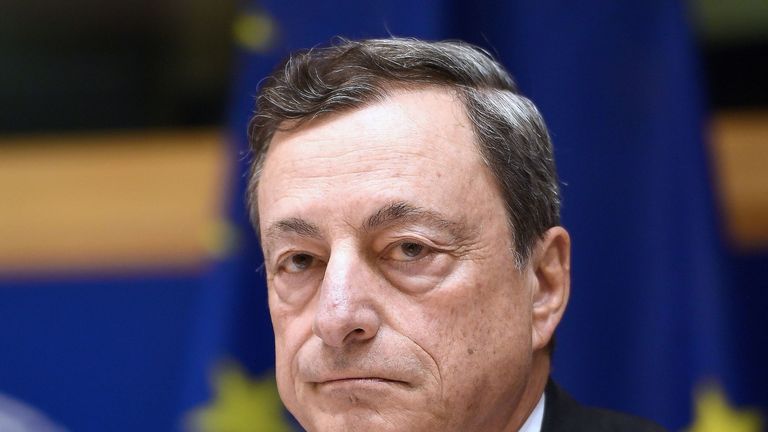Trump cries foul as Draghi stimulus pledge knocks euro
The fallout from the US-China trade war sees the ECB signal renewed support for eurozone growth - angering president Trump.
Tuesday 18 June 2019 18:45, UK
The head of the European Central Bank (ECB) has come under attack from Donald Trump after he pledged "additional stimulus" if the eurozone economy continues to flag.
Mario Draghi's remarks prompted European stock markets to surge and the euro to fall against a basket of international currencies - including the dollar.
The prospect of renewed monetary policy support for economic activity is made against the backdrop of plunging demand in the world economy as the US fights a trade war with China.
The currency shift prompted the US president to resume hostilities with the bank.
Mr Trump wrote on Twitter: "Mario Draghi just announced more stimulus could come, which immediately dropped the euro against the dollar, making it unfairly easier for them to compete against the USA.
"They have been getting away with this for years, along with China and others."
The trade war fallout has already prompted the ECB's US counterpart, the Federal Reserve, to put the brakes on its policy path of interest rate hikes.
It is expected to signal later this week that more support is likely to bolster growth that has slowed this year as the trade war has escalated.
However, Mr Trump sounded a more emollient tone on the dispute on Tuesday, saying he "had a very good conversation" with Chinese president Xi Jinping and that teams from both countries would restart trade talks ahead of the G20 summit later this month.
The euro area - particularly export-dependent economies such as Germany's - has not been immune from the fallout in the dispute between the world's two largest economies.
Slowing export and domestic demand followed the ECB's decision to end its post-crisis bond-buying stimulus, known as quantitative easing (QE), at the end of last year.
Other policies, such as record low interest rates, have remained to ensure all the taps were not turned off at once.
Mr Draghi told the ECB's annual conference in Portugal that persistently low inflation could not be tolerated.
He said: "In the absence of improvement, such that the sustained return of inflation to our aim is threatened, additional stimulus will be required."
He added: "(We) will use all the flexibility within our mandate to fulfil our mandate - and we will do so again to answer any challenges to price stability in the future."
Economists pointed out that there was little ammunition available for the ECB - raising doubts over the effectiveness of further stimulus.
The bank has €4.7trn (£3.8trn) of bonds on its balance sheet from its four-year QE programme, while its core refinancing rate stands at 0%.
Mr Draghi said the ECB still had "considerable headroom" for more asset purchases - and the ECB would use the weeks leading up to its July meeting to study its options.
Rate cuts were not ruled out.
Market experts suggested it was most likely that the ECB would cut the so-called deposit rate further into negative territory, meaning that the cost for banks to park money with the ECB would go up - encouraging them to lend the cash instead.
Mr Draghi's comments helped send the euro lower against the dollar and sterling while stock markets climbed sharply - the latter also lifted by Mr Trump's remarks.
Craig Erlam, senior market analyst at Oanda, said of Mr Draghi's latest intervention: "There were no hints at when policy loosening will come but the admission that these options were discussed at the last meeting and will be discussed in future suggest we may not be far away."
The German DAX and CAC 40 in France both closed more than 2% higher, while the FTSE 100 was 1.2% up at the close.
In New York, the Dow Jones Industrial Average was also more than 1% higher.





